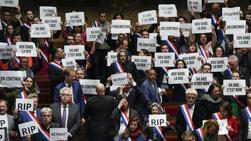 Far-left lawmakers react as they hold papers reading: "64 years. It is no", "appointment in the street", "we are continuing", at the National Assembly in Paris at the National Assembly in Paris, March 20, 2023. (PHOTO / AP)
Far-left lawmakers react as they hold papers reading: "64 years. It is no", "appointment in the street", "we are continuing", at the National Assembly in Paris at the National Assembly in Paris, March 20, 2023. (PHOTO / AP)
PARIS – French President Emmanuel Macron was consulting allies on Tuesday on what to do next after his government barely survived a no-confidence motion, violent protests erupted across the country and unions stepped up strikes.
Protesters played cat-and-mouse with police for a fifth night on Monday, setting bins and barricades on fire and leaving Macron to face the most dangerous challenge to his authority since the "Yellow Vest" revolt over four years ago.
French President Emmanuel Macron will break his silence on Wednesday with a TV interview, to "outline what happens now," government spokesman Olivier Veran said
The failure of the no-confidence vote – by a mere nine votes – means his flagship pension reform raising the retirement age by two years to 64, is adopted, in a relief for Macron, who has made it a key plank of his second mandate.
But even lawmakers in the centrist president's camp warned the crisis was far from over.
"We are all weakened. The president, the government and the majority," a senior MP in Macron's camp, Gilles Le Gendre, told Liberation newspaper. "It's not because the law was adopted that we can do business as usual."
Macron will break his silence on Wednesday with a TV interview, to "outline what happens now," government spokesman Olivier Veran said.
"These are basically Macron's two choices," Eurointelligence analysts wrote in a note. "Pretending that nothing major happened and letting the crisis wear itself out, or pursuing co-habitation with the willing in the assembly."
ALSO READ: Pressure mounts on Macron after violent unrest over pensions
"Given Macron's nature, we see him being more attracted to the first option. A risky bet."
Macron will hold talks on Tuesday with Prime Minister Elisabeth Borne, the heads of both houses of parliament and lawmakers in his political camp as he seeks to plot an exit to the political crisis.
One key question in coming days will be whether Macron sticks with his existing government or looks to freshen things up, even if the potential paralysis in parliament will make governing more complicated.
"The government is finished," said Fabien Roussel, secretary general of the Communist party.
What next?
Sacha Houlie, an MP in Macron's camp, brushed off the possibility of a change of prime minister.
"What we expect from the President of the Republic is that he draws up an outlook ... a three-, six-month calendar (of reforms)," he told Reuters, saying he hoped for proposals on issues including how businesses could be pushed to share more of their profits with workers.
But another MP in Macron's camp, Patrick Vignal, bluntly urged the president to suspend the pension reform bill in the face of the anger it has triggered, and its deep unpopularity.
READ MORE: Pension overhaul: Police clash with protesters in Paris
More than 200 people were arrested on Monday evening, police said, after spontaneous protests broke out hours after the no-confidence motion failed.
What may concern the executive is the large number of young people in the demonstrations.
 Police officers prevent protesters from blocking traffic in Bidart, southwestern France on March 21, 2023. (PHOTO / AP)
Police officers prevent protesters from blocking traffic in Bidart, southwestern France on March 21, 2023. (PHOTO / AP)
Television images showed police firing tear gas and charging at protesters in several towns. Some special motor bike officers were seen striking out at protesters.
Polls show the majority of French are opposed to the pension reform, as well as the government's decision to push the bill through parliament without a vote.
"I think this was a denial of democracy. The government passed a law which a majority of French people were against," script writer Jean Regnaud said.
"We did not give him (Macron) a mandate to pass these reforms, which are unjust."
Strikes at petrol depots in southeastern France have led to shortages and rationing, forcing the government on Tuesday to order the requisitioning of staff to ensure supplies.
A nationwide day of strikes and protests is planned for Thursday.


